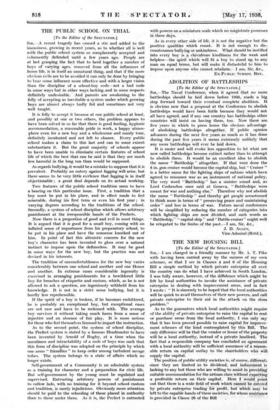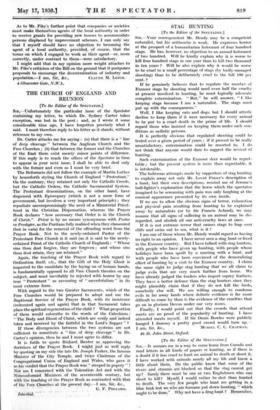THE NEW HOUSING BILL [To the Editoi of the SPECTATOR.]
SIE,—I am charged in a friendly manner by Mr. A. T. Pike with having been carried away by the success of my own schemes, so that I see in Clauses 4 and 6 of, the Housing Bill a simple method by which private enterprise all over the country can do what I have achieved in South London. I was fully aware, however, of the diffidence which might be felt by local authorities to invoke the assistance of private enterprise in dealing with improvement areas, and in fact I wrote : " It is sincerely to be hoped-that the local authorities will be quick to avail themselves of their new powers, and call private enterprise to their aid in the attack on the slum problem."
As to the guarantees which local authorities might require of the ability of private. enterprise to raise the capital to rent or purchase areas from the local authority, I can only say that it has been proved possible to raise capital for improve- ment schemes of the kind contemplated by this Bill. The only difference will be that the vendor or lessor of the property will be a local authority, instead of a private landlord. The fact that a responsible company has concluded an agreement with a local authority will be sufficient assurance Of a reason- able return on capital outlay to the shareholders whO will supply the capital.
The position of public utility societies is, of course, different, since they are limited as to dividend, and inducement is lacking to any but those who are willing to assist in providing suitable accommodation for the artisan claks without expceting a profitable return on their capital. Here I would, point out that there is a wide field of work which cannot be entered by private enterprise trading tor profit, but which may be left to the capable hands of these societies, for whom assistance is provided in Clause 26 of the Bill
As to Mr. Pike's further point that companies or societies must make theitiseliies agents of the local authority in order to. receive grants for providing new houses to accommodate persons displaced by improvement schemes, I can only say that I myself should have no, objection to becoming the agent of a- local authority, proVided, of course, that the terms on which I engaged to work as their agent—or, more correctly, under contract to them—were satisfactory.
I might add that in my opinion more weight attaches to Mr. Pike's criticism of the Bill on the ground that it postpones proposals to encourage the decentralization of industry and















































 Previous page
Previous page